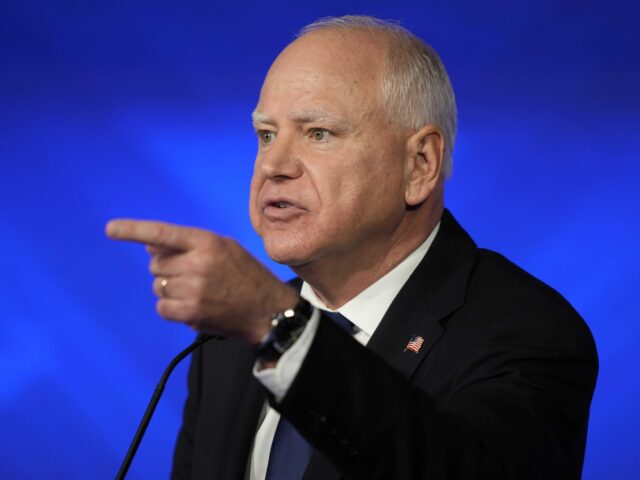CLAIM: Tim Walz said, about free speech: “You can’t yell fire in a crowded theater. That’s the test.”
VERDICT: FALSE. That is not the constitutional standard, and Walz could not defend his record on censorship.
The Minnesota governor found himself on the defensive at the vice presidential debate on Tuesday night on CBS, when Sen. JD Vance (R-OH) turned a question about January 6 as a “threat to democracy” into a criticism of Vice President Kamala Harris’s support for Internet censorship. Vance noted that Walz, too, had said (incorrectly) that “misinformation,” however defined, was not protected under the First Amendment.
Walz tried to claim that he was only talking about speech such as shouting “fire in a crowded theater,” which he claimed was the “test.”
That is a popular misconception. The Foundation for Individual Rights and Expression noted: “Anyone who says ‘you can’t shout fire! in a crowded theatre’ is showing that they don’t know much about the principles of free speech, or free speech law — or history.”
Moreover, as Reason magazine explained recently:
The erroneous idea comes from the 1919 case Schenk v. United States. The case concerned whether distributing anti-draft pamphlets could lead to a conviction under the Espionage Act—and had nothing to do with fires or theaters.
In his opinion, Justice Oliver Wendell Holmes wrote that “the most stringent protection of free speech would not protect a man in falsely shouting fire in a theatre and causing a panic.” However, this idea was introduced as an analogy, meant to illustrate that, as Trevor Timm wrote in The Atlantic in 2012, “the First Amendment is not absolute. It is what lawyers call dictum, a justice’s ancillary opinion that doesn’t directly involve the facts of the case and has no binding authority.” The phrase, though an oft-repeated axiom in debates about the First Amendment, is simply not the law of the land now, nor has it ever been—something made all the more apparent when Schenk v. United States was largely overturned in 1969 by Brandenburg v. Ohio.
Brandenburg, Oyez notes, established a two-pronged test:
“(1) speech can be prohibited if it is ‘directed at inciting or producing imminent lawless action’ and (2) it is ‘likely to incite or produce such action.'”
Walz’s opponent, Sen. JD Vance (R-OH), noted that people weren’t being censored on the Internet under the Biden-Harris administration for shouting “fire,” but rather “for saying that toddlers shouldn’t wear masks.” That, he said, was ordinary political speech that should be protected under the First Amendment.
Joel B. Pollak is Senior Editor-at-Large at Breitbart News and the host of Breitbart News Sunday on Sirius XM Patriot on Sunday evenings from 7 p.m. to 10 p.m. ET (4 p.m. to 7 p.m. PT). He is the author of The Agenda: What Trump Should Do in His First 100 Days, available for pre-order on Amazon. He is also the author of The Trumpian Virtues: The Lessons and Legacy of Donald Trump’s Presidency, now available on Audible. He is a winner of the 2018 Robert Novak Journalism Alumni Fellowship. Follow him on Twitter at @joelpollak.

COMMENTS
Please let us know if you're having issues with commenting.